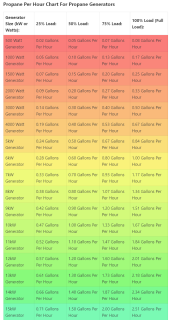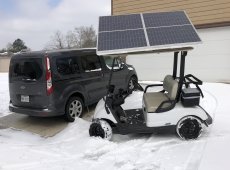Whoa baby! I knew this was the place to go. Marvelous responses. MurphyGuy you may have just saved me a ton of money.
I have taken a stab at my power needs and I thought I might be able to get by with a solar option. My biggest challenge was figuring out how long the solar option would hold up. My other big concern was relying on gas during a storm when all the stations are out.
However storing LP gas is a great idea since it will last forever (unlike gasoline).
If I pull the trigger on the GenMax I guess you guys won’t see as much of me as I thought.
Again thanks so much for the honesty!
While you need a generator for the occasional hurricane, up here in the rural Michigan countryside where we're surrounded by corn and cows, we lose grid power quite often when storms come through. We're so accustomed to it its not even a big deal. And since the population is so sparse, we can be without grid power for a week at a time. I have a lot of experience with generators and am kind of the neighborhood guy everyone comes to.
On the issue of sizing the generator:
The bigger your generator, the more energy it will use regardless of you actually drawing energy from it. A 5000 watt generator running a home that is averaging 1200 watts is going to use A LOT less fuel than a 9000 watt unit doing the same.
I have to say, 9000 watts is a LOT of power. My home has 3 chest style deep freezers, 2 fridges, 3 computers, a television, well water pump, sump pump, and a whole bunch of other stuff. I have a 5500 watt generator that turns into a 4500 watt generator because I run it on natural gas. It runs the entire house without hardly breaking a sweat. It will NOT run the electric clothes dryer.. and while it will run the 2 ton air conditioner, it puts a good load on it.
With our solar/battery-backup system, we now only use the generator when the sun doesn't cooperate. The generator no longer runs the house, it just charges the batteries. I tell the off-grid system to pull 15 amps from the generator and it will pull exactly 15 amps. The generator runs for 4 or 5 hours and then shuts off and the battery will carry the house for the next day or so if the sun doesn't come out.
Solar rocks! Being on off-grid solar during a grid down event is very cool, but you still need a gas generator for those dark gray days. Our off-grid solar easily runs the air conditioner and clothes dryer.
On the issue of what generator to purchase:
Generators being manufactured today are very cheaply made, which is why I won't buy one. The only exception to this are the Honda's, but make sure you're sitting down when you go look at prices.
Like most appliances today, they are fitting these generators will all kinds of computers and other bells and whistles, and if any of that stuff stops functioning, the entire unit craps out.
Seriously, go buy an older generator.. Something like a Coleman Powermate that is nothing but an engine, power head, and a panel with some plugs and a couple circuit breakers. (see photo below for example) You can easily convert a generator like this with a $200 kit so it runs on propane, natural gas, OR regular gasoline. (I think US Carb makes the best kits and is what I use) This is what I did and my generator is ultra reliable. It is also stupidly easy to fix. You should be able to find one of these on craigslist or facebook for $200 or less. Bring a compression tester.. if it has good compression, everything else is simple.
Some generator notes:
1) When buying any generator, take a look at the gas cap on top of the fuel tank and imagine what would happen if it started raining. Some generators are designed in a way that if you fill them with gas and spill a little, the gas is contained within an indentation around the gas cap. Great idea, except when it rains, that safety feature fills up with water and the water goes into the gas tank and damages everything. Stay way from those types.
2) The super efficient "inverter" type generators are great for running televisions, power tools, and stuff like that. But because of all the electronics, there's a lot to go wrong with them and they don't handle big surge loads like motors very well. Again, with the exception of the Honda's, most are low quality units. I would not recommend them for running an entire house.
3) Change the oil !! Yup, most generators, regardless of what the manual says, need an oil change every 24 hours of operation. If you want it to last, make sure you change that oil. Some of the 2 cylinder units can go a lot longer than 24 hours, but just make sure you change it and always have oil on hand. I always keep two 5-gallon bucks of the oil in stock. Our generator uses about 1.4 quarts.
4) You can tell how many hours a used generator has on it by simply looking at the muffler. Shiny chrome muffler = low hours.. Rusted muffler = high hours.
6) Any generator you purchase should have a plastic gas tank. Steel tanks rust, its that simple.
7) If you can find a Coleman Powermate with a Tecumseh engine (picture below), I would highly recommend it. Tecumseh engines run forever and coleman generators usually have good solid power heads. (although I have little experience with their newer units so can't comment)
8) I would strongly suggest you stay away from anything made in China.. Champion Generators are made in the USA if you insist on getting a new unit.
9) Don't spend all your hard earned money on a fancy generator with a flashy paint job. Seriously, that's why they make them "look cool" these days. Most American consumers are more interested in flash than in function and its a big mistake when your family's comfort is on the table.
Hope this helps, good luck.






